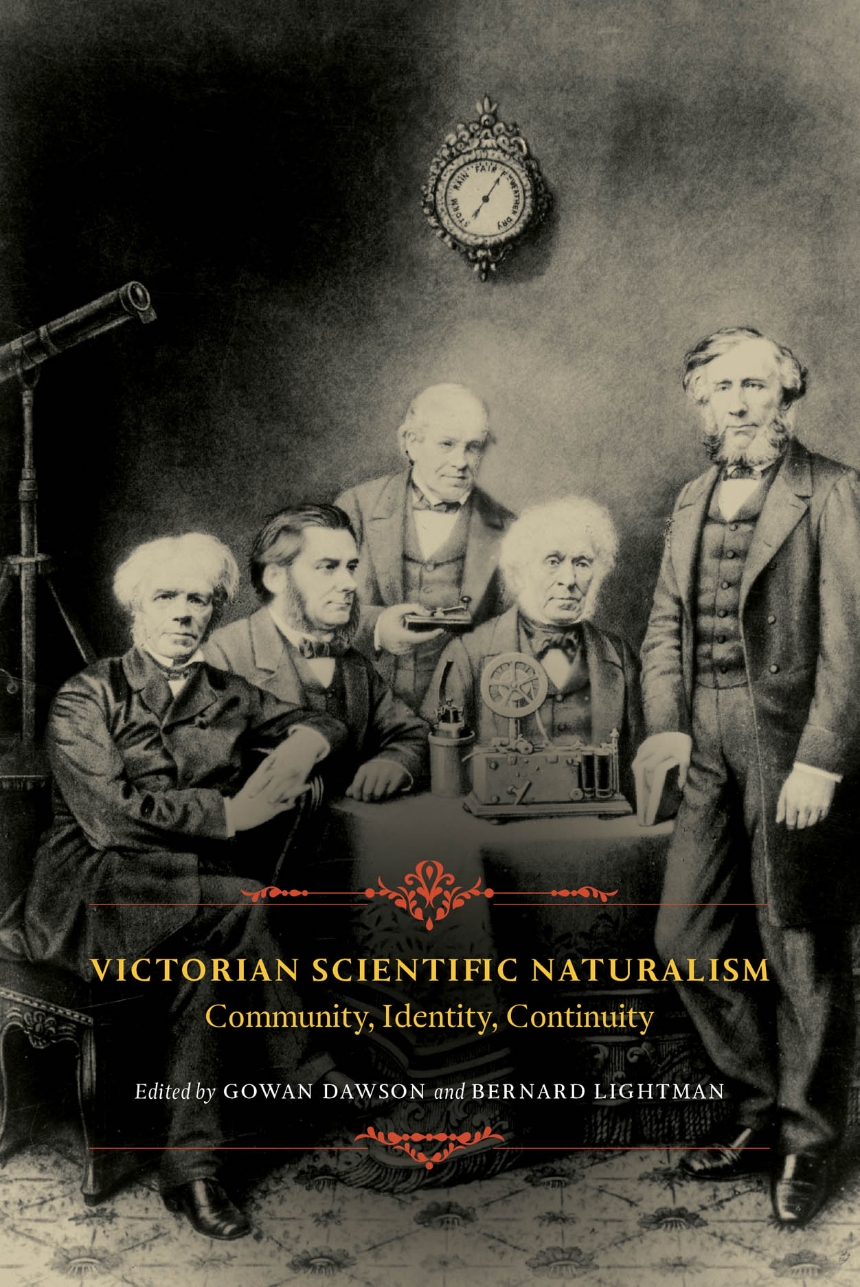Victorian Scientific Naturalism
Community, Identity, Continuity
Victorian Scientific Naturalism examines the secular creeds of the generation of intellectuals who, in the wake of The Origin of Species, wrested cultural authority from the old Anglican establishment while installing themselves as a new professional scientific elite. These scientific naturalists—led by biologists, physicists, and mathematicians such as William Kingdon Clifford, Joseph Dalton Hooker, Thomas Henry Huxley, and John Tyndall—sought to persuade both the state and the public that scientists, not theologians, should be granted cultural authority, since their expertise gave them special insight into society, politics, and even ethics.
In Victorian Scientific Naturalism, Gowan Dawson and Bernard Lightman bring together new essays by leading historians of science and literary critics that recall these scientific naturalists, in light of recent scholarship that has tended to sideline them, and that reevaluate their place in the broader landscape of nineteenth-century Britain. Ranging in topic from daring climbing expeditions in the Alps to the maintenance of aristocratic protocols of conduct at Kew Gardens, these essays offer a series of new perspectives on Victorian scientific naturalism—as well as its subsequent incarnations in the early twentieth century—that together provide an innovative understanding of the movement centering on the issues of community, identity, and continuity.
368 pages | 12 halftones, 2 line drawings, 1 table | 6 x 9 | © 2014
History: History of Ideas
Physical Sciences: History and Philosophy of Physical Sciences
Reviews
Table of Contents
Introduction, Gowan Dawson and Bernard Lightman
Forging Friendships
1 “The Great O. versus the Jermyn St. Pet”: Huxley, Falconer, and Owen on Paleontological Method
Gowan Dawson
2 Evolutionary Naturalism on High: The Victorians Sequester the Alps
Michael S. Reidy
3 Paradox: The Art of Scientifi c Naturalism
George Levine
Institutional Politics
4 Huxley and the Devonshire Commission
Bernard Lightman
5 Economies of Scales: Evolutionary Naturalists and the Victorian Examination System
James Elwick
6 Odd Man Out: Was Joseph Hooker an Evolutionary Naturalist?
Jim Endersby
Broader Alliances
7 Sunday Lecture Societies: Naturalistic Scientists, Unitarians, and Secularists Unite against Sabbatarian Legislation
Ruth Barton
8 The Conduct of Belief: Agnosticism, the Metaphysical Society, and the Formation of Intellectual Communities
Paul White
9 Where Naturalism and Theism Met: The Uniformity of Nature
Matthew Stanley
New Generations
10 The Fate of Scientifi c Naturalism: From Public Sphere to Professional Exclusivity
Theodore M. Porter
11 The Successors to the X Club? Late Victorian Naturalists and Nature, 1869–1900
Melinda Baldwin
12 From Agnosticism to Rationalism: Evolutionary Biologists, the Rationalist Press Association, and Early Twentieth-Century Scientific Naturalism
Peter J. Bowler
Acknowledgments
Bibliography of Major Works on Scientific Naturalism
List of Contributors
Index
Forging Friendships
1 “The Great O. versus the Jermyn St. Pet”: Huxley, Falconer, and Owen on Paleontological Method
Gowan Dawson
2 Evolutionary Naturalism on High: The Victorians Sequester the Alps
Michael S. Reidy
3 Paradox: The Art of Scientifi c Naturalism
George Levine
Institutional Politics
4 Huxley and the Devonshire Commission
Bernard Lightman
5 Economies of Scales: Evolutionary Naturalists and the Victorian Examination System
James Elwick
6 Odd Man Out: Was Joseph Hooker an Evolutionary Naturalist?
Jim Endersby
Broader Alliances
7 Sunday Lecture Societies: Naturalistic Scientists, Unitarians, and Secularists Unite against Sabbatarian Legislation
Ruth Barton
8 The Conduct of Belief: Agnosticism, the Metaphysical Society, and the Formation of Intellectual Communities
Paul White
9 Where Naturalism and Theism Met: The Uniformity of Nature
Matthew Stanley
New Generations
10 The Fate of Scientifi c Naturalism: From Public Sphere to Professional Exclusivity
Theodore M. Porter
11 The Successors to the X Club? Late Victorian Naturalists and Nature, 1869–1900
Melinda Baldwin
12 From Agnosticism to Rationalism: Evolutionary Biologists, the Rationalist Press Association, and Early Twentieth-Century Scientific Naturalism
Peter J. Bowler
Acknowledgments
Bibliography of Major Works on Scientific Naturalism
List of Contributors
Index
